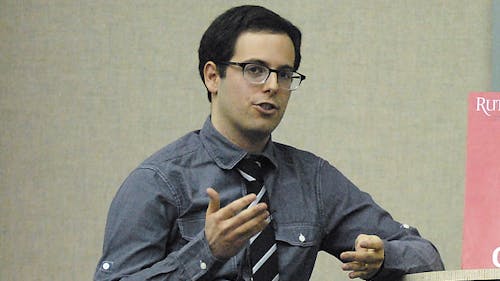Writer finds humor in politics

Elliott Kalan, a writer for “The Daily Show with Jon Stewart,” spoke on his experiences in the entertainment world on Wednesday and shared the importance of presenting the news in a comedic way.
“Humor and Politics: How to Write Jokes When the News is Ridiculous” was presented as a conversation between Kalan and Ruth Mandel, the director of the Eagleton Institute of Politics, at the Douglass Campus Center, combining hard politics with soft humor.
Kalan said comedy should be viewed as a fine craft, but it is important to acknowledge that its usefulness is limited to certain situations.
“It’s like having a wild horse,” he said. “If you want to get somewhere really fast and you can’t take a car, then a wild horse is great. But in almost any other situation, a wild horse would be a bad idea. That’s what comedy is.”
Kalan said a sense of humor can come in handy at times, but it can be harmful if the setting calls for a more serious approach.
“A lot of trouble comes with [a sense of humor]. It’s a really good thing to have in situations where it’s good to be funny, but it’s not good to have in situations where being funny is the last thing you want to be — like a funeral,” he said.
Kalan, a New York University alumnus, said he always dreamed of following in the footsteps of the late Andy Rooney, a humorist and news reporter who worked for “60 Minutes” for 33 years.
“[Rooney] has a specific mindset,” Kalan said. “It’s not just that he [was] irritated by everyday things. He’s irritated at things that don’t follow his mindset. It allowed him to say whatever he wanted, and I think that’s wonderful.”
Kalan said his family’s sense of humor led to his venture into comedy, and it was a general upbringing that led to him loving the industry.
“I come from a funny family, but I was the first to go to comedy,” Kalan said. “As for a [specific] moment, I wish I could say there was the moment I was bitten by the radioactive spider, but no.”
Kalan said there was no definitive path to achieving a career in writing for the entertainment industry because the industry lacks the structure that is more common in other fields.
“There is no real way to get writing jobs. It all helps. There are no rules. There are no step-by-step guides,” Kalan said.
Kalan said working at “The Daily Show” requires a balance between the writer’s passion for politics and comedy, but he was always more invested in the humorous side of the job.
“I came from a very political family, but the interest came in comedy first,” he said. “It’s easy to write about the government because there’s almost no point in history when the government hasn’t sucked.”
Kalan said Stewart’s role in the comedy process is invaluable, as the host always has a hand in the show’s jokes.
“He’s the alpha and omega of it all. He’s the genesis and the revelations. There is very little in the show that doesn’t originate with him,” Kalan said.
One of the main difficulties in entertainment writing is keeping the show fresh and consistently funny, a fact that is acknowledged by “The Daily Show” writers, Kalan said.
“You’re not going to hit a homerun everyday,” he said.
Nicholas Rapon, a School of Arts and Sciences first-year, said the event inspired him to explore a career path in a field similar to that of Kalan.
“It helped me figure out my own writing path and how I might want to do satire myself,” Rapon said.
Connor Smith, a School of Arts and Sciences sophomore, said the event gave the audience a chance to see “The Daily Show” through the eyes of the writers — something that cannot be achieved through the show’s episodes.
“It’s cool to see the humor of ‘The Daily Show’ not fed through the mouth of Jon Stewart,” Smith said.



